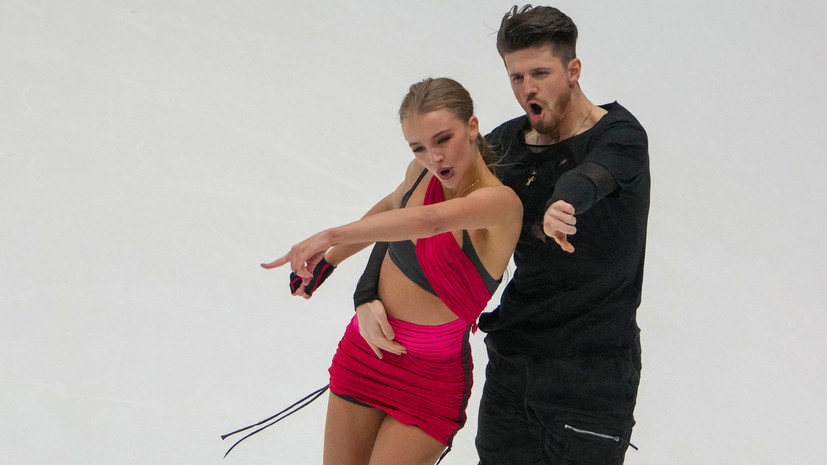On Friday, Russian ice dancers took the first step towards repeating the result recorded in pair skating - taking all three steps of the European podium. Almost all journalists talked about this seemingly unrealistic task, and not unreasonably. The likelihood that Diana Davis and Gleb Smolkin could take third place seemed absurd a few months ago, but in vain: Igor Shpilband's duet, having seized on adult ice, began to progress from tournament to tournament so powerfully that it did not fit into any framework ideas about a sport where a high result of anyone was always preceded by a fairly solid length of service.
To understand the scale of this progress, we can cite the numbers: in the final of the Russian Cup-2021, with home refereeing and maximum privileges, the result of Diana and Gleb was 186.38 points.
And in December of the same year, the duo became the silver medalist of the Russian Championship, gaining 207.70.
When this happens in dance - the most conservative form of figure skating - the topic of refereeing invariably begins to be exaggerated.
The train of the “thieves couple” accompanied the daughter of Eteri Tutberidze and her partner at almost all the starts of the season, so it was curious how the third Russian couple would be judged in Tallinn.
Moreover, the skaters came to the championship with an outstanding personal record in rhythm dance - 81.30.
Diana and Gleb scored this amount at the second-class challenger tournament in Warsaw, where, to the great amazement of the figure skating public, the work of the judging dance team was personally monitored by the first vice-president of the International Skating Union, Alexander Lakernik.
To the credit of Davis and Smolkin, it is worth noting that the debut of the pair among the strongest turned out to be bright.
In dancing, it is not so easy to attract attention: everything is too much subordinated to work on obtaining the highest possible levels of complexity.
The richer the program, the more difficult it is to dance in it, not to mention the fact that any, even a tiny blot, can spoil the whole impression.
The newbies were dancing.
Plus they were very lucky with the coach.
As soon as the new refereeing system was put into use, Igor Shpilband began to be considered perhaps the best specialist in the world of ice dancing in terms of technical transitions and steps.
Well, after the coach became a co-author of the Olympic victories of Tessa Virtue - Scott Moir and Meryl Davis - Charlie White, who dictated dance fashion for two Olympic cycles, his mere presence at the board began to be perceived by the arbitrators as a notorious sign of quality.
But Davis and Smolkin did not succeed in repeating their personal record in Tallinn or at least getting close to it: they received only 73.32 points for the rental, and this amount involuntarily raised the question: if the score really reflects the real class of skaters, then what were the judges looking at? who appreciated the couple's skiing in Warsaw?
By the time Stepanova and Bukin entered the ice, the third Russian duet was already in fourth position (as a result, Davis and Smolkin flew to eighth, losing to everyone in the strongest warm-up), and Italian champions Charlene Gignard and Marco Fabbri took the lead with respect, but not frightening 83.35 points.
The Italian duet, unlike Alexandra and Ivan, qualified for the Grand Prix final this season, and although the rivals did not cross paths at the stages, the result of the Italians at the final start of the series in Sochi was slightly higher than that of Stepanova and Bukin in Turin and Grenoble.
Therefore, the confrontation was of a fundamental nature.
Stepanova and Bukin emerged victorious from this duel.
They not only skated better than the Italians, but also improved their personal record by 2.38 points, getting 86.45.
But something else turned out to be more interesting: only 1.44 points separated them from the current world champions Sinitsina and Katsalapov in rhythm dance, although the difference between the two pairs just three weeks ago at the Russian Championship was almost 3.5 times more.
In Tallinn, Sinitsina and Katsalapov got 87.89 (with a personal record of 88.73), losing points in the partial step track and the center track (both times - the third level of difficulty instead of the fourth).
However, losses in steps, although slightly less significant, were also recorded by Stepanova and Bukin.
Katsalapov explained this by saying that the steps are too thin matter: you never know what exactly the judges will see on their monitors and what they will find fault with.
According to the skater, he was sure that he had done everything perfectly.
On Saturday, he and his partner will have to convince the judges that they are right, otherwise the duel with compatriots may end in favor of the latter.
Behind the Russian showdowns at the highest level, the amazingly emotional rental of the English Lila Fir and Louis Gibson went into the shadows.
They interpreted the Kiss compilation so successfully that they received the best ratings in their careers and made a significant bid to take a place in the top 5 for the first time in their career: so far they are in the intermediate fourth position with a score of 79.97 points.

